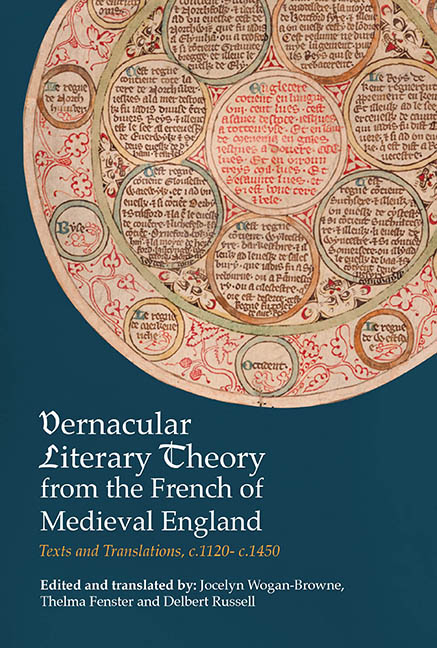 Vernacular Literary Theory from the French of Medieval England
Vernacular Literary Theory from the French of Medieval England Book contents
- Frontmatter
- Dedication
- Contents
- List of Maps and Illustrations
- Preface
- Abbreviations
- Map
- General Introduction
- Establishment of Texts and Translations and Conventions Used
- Part I Faus franceis and dreit engleis: On Language
- Part II Si sa dame ne li aidast: Authorship and the Patron
- Part III Primes dirrum la dreyte fei: The Conduct of Reading, Hearing and Seeing
- Part IV Ki veult oïr: Forming Audiences and Creating Textual Communities
- Part V Si come en latyn trovay escrit: The Lineage of the Text
- Postlude. Honneurs publiées … en divers royaumes
- Part VI Essays and Resources
- Timeline
- Glossary
- Bibliography
- General Index
- Index of Manuscripts
General Introduction
Published online by Cambridge University Press: 25 October 2017
- Frontmatter
- Dedication
- Contents
- List of Maps and Illustrations
- Preface
- Abbreviations
- Map
- General Introduction
- Establishment of Texts and Translations and Conventions Used
- Part I Faus franceis and dreit engleis: On Language
- Part II Si sa dame ne li aidast: Authorship and the Patron
- Part III Primes dirrum la dreyte fei: The Conduct of Reading, Hearing and Seeing
- Part IV Ki veult oïr: Forming Audiences and Creating Textual Communities
- Part V Si come en latyn trovay escrit: The Lineage of the Text
- Postlude. Honneurs publiées … en divers royaumes
- Part VI Essays and Resources
- Timeline
- Glossary
- Bibliography
- General Index
- Index of Manuscripts
Summary
French in and out of England
In England and North America, the multiplicity of languages, the conflicts and mobility of power and race, and the frequent violence and repression that have characterised negotiations among them all, together make an authoritative language too touchy a point to invite rational institutionalisation. The improbability and illogic of a single, authoritative tongue lie too close to the surface; and its real instability is too plain, even on cursory examination. (Baswell 2005)
Older models of one language, one nation, one literature have increasingly come to seem inadequate for the study of England's medieval culture, in its internal dimensions as much as in its external exchanges and contacts. Recent work with multilingualism as an explicit paradigm for enquiry gives us ways to move beyond rigid associations between language and nation in the exploration of medieval European cultures. Not that multilingualism is in every circumstance a self-evident good, then or now: the medieval paradigm of the tower of Babel as a fall into mutually incomprehensible languages cast a long shadow, even if redeemed by Pentecost's endowment of the apostles with tongues of fire. The Herefordshire writer Simund de Freine observes in his late-twelfth-century French reworking of Boethius (see (38) below) that ‘linguistic diversity hinders the spread of fame’. To set against the richness and flexibility of lexicon, register, and allusion for multilingual speakers and writers there is much medieval commentary, serious or playful, on failures of comprehension. Nevertheless, whether perceived as advantageous or problematic, multilingualism has become a newly explicit approach for literary and linguistic study. In addition to new models for how we conceptualise language and new investigations into previously neglected aspects of language use in England, current scholarship's emphasis on the materiality of medieval textual culture necessarily embraces the multilingualism of medieval texts and manuscript collections on the page and in the codex, while socio- linguistic approaches to the uses and performance of text in both documentary and literary culture address the multilingualism and plurilingualism of medieval audiences.
In the light of these new approaches, it is clear that students and scholars of insular culture need to think multilingually. It may therefore seem perverse to offer a volume on the French of England rather than England's multilingualism as such.
- Type
- Chapter
- Information
- Vernacular Literary Theory from the French of Medieval EnglandTexts and Translations, c.1120- c.1450, pp. 1 - 6Publisher: Boydell & BrewerPrint publication year: 2016


